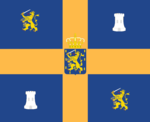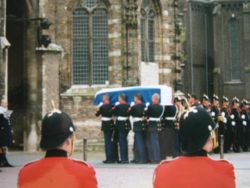- Prince Claus of the Netherlands
-
Claus van Amsberg Prince of the Netherlands (more) 
Prince Claus of the Netherlands in 1970 Prince Consort of the Netherlands Tenure 30 April 1980 – 6 October 2002
(22 years, 159 days)Spouse Beatrix of the Netherlands
mar. 1966 – wid. 2002Issue Willem-Alexander, Prince of Orange
Prince Friso
Prince ConstantijnFull name Claus George Willem Otto Frederik Geert van Amsberg House House of Amsberg Father Claus Felix von Amsberg Mother Gösta von dem Bussche-Haddenhausen Born 6 September 1926
Hitzacker, Weimar RepublicDied 6 October 2002 (aged 76)
Amsterdam, NetherlandsBurial 15 October 2002
Nieuwe Kerk, DelftOccupation Diplomat Religion Reformed Protestant Prince Claus of the Netherlands (Dutch: Jhr. Claus van Amsberg; birth name: Klaus-Georg von Amsberg; 6 September 1926 – 6 October 2002) was the prince consort of the current Queen regnant of the Netherlands, Queen Beatrix.
Contents
Biography
Prince Claus was born Klaus-Georg Wilhelm Otto Friedrich Gerd von Amsberg, on his family's estate, Haus Dötzingen near Hitzacker, Germany. His parents were Claus Felix von Amsberg and Baroness Gösta von dem Bussche-Haddenhausen. His father, a member of the untitled German nobility, operated a large farm in Tanganyika from 1928 until World War II. Claus and his six sisters grew up on their grandparents' manor in Lower Saxony; he also attended a boarding school in Tanzania from 1936 to 1938.
The future prince was a member of such Nazi youth organisations as Deutsches Jungvolk and the Hitler Youth (membership in the latter was mandatory for all fit members of his generation) [1]. From 1938 until 1942, he attended the Baltenschule Misdroy.
In 1944, he was conscripted into the German Wehrmacht, becoming a soldier in the German 90th Panzergrenadier Division in Italy in March, 1945, but taken as a prisoner of war by the American forces at Meran before taking part in any fighting. After his repatriation, he finished school in Lüneburg and studied law in Hamburg. He then joined the German diplomatic corps and worked in Santo Domingo and Côte d'Ivoire. In the 1960s, he was transferred to Bonn.
Claus and Beatrix met at the wedding-eve party of Princess Tatjana of Sayn-Wittgenstein-Berleburg and Moritz, Landgrave of Hesse, in the summer of 1964. Sections of the Dutch population were unhappy that Beatrix's fiancé was a German, only twenty years after the end of the war, and there were protests during the wedding celebrations, most notably by the anarchist-artist group Provo. The pair nonetheless were married on 10 March 1966.
Over time, Claus became accepted by the public, so much so that during the last part of his life he was generally considered the most popular member of the Royal Family.[1] This change in Dutch opinion was brought about by Claus's strong motivation to contribute to public causes (especially third-world development, on which he was considered an expert), his sincere modesty, his candor (within but sometimes on the edge of royal protocol), and his approachability by all levels of society.
The public also sympathised with Claus for his efforts to give meaning to his life beyond the restrictions that Dutch law imposed on the Royal Family's freedom of speech and action (lest they get involved in political controversy). Many also believed that these restrictions were at least partly the cause of his severe depression, which lasted many years. As a result, restrictions were loosened; Claus was even appointed as senior staff member at the Department of Developing Aid, albeit in an advisory role.
A fine example of his mildly rebellious attitude toward protocol was the "Declaration of the Tie". In 1998, after presenting the annual Prince Claus Awards to three African fashion designers, Claus told "workers of all nations to unite and cast away the new shackles they have voluntarily cast upon themselves", meaning the necktie, that "snake around my neck," and encouraged the audience to "venture into open-collar paradise". He then removed his tie and threw it on the floor.[2]
In 2001, when on Dutch television he announced the marriage of his son Willem-Alexander, Prince of Orange, and Máxima Zorreguieta, an Argentine woman of Spanish and Italian descent, Prince Claus referred to himself as more a citizen of the world than anything else.
Titles and style
- Klaus von Amsberg (1926–1965)
- Jhr. Claus van Amsberg (1965–1966); his name was changed officially after obtaining Dutch citizenship
- His Royal Highness Prince Claus of the Netherlands, Jonkheer van Amsberg (1966–2002)[3]
- His Royal Highness The Prince of the Netherlands (1980–2002); as a prince consort of a Queen of the Netherlands, Prince Claus was legally entitled to this style and title, though out of respect for his father-in-law, Prince Bernhard of the Netherlands, he never officially used this title
Prince Claus was appointed Honorary Fellow of The International Institute of Social Studies (ISS) in 1988. Prince Claus was held in very high esteem in the international development cooperation community, partly because of his considerable insight and understanding of the problems involved, and partly because of his exceptional gift for expressing the hopes and anxieties felt by all.
Ancestry
Ancestors of Prince Claus of the Netherlands 16. Joachim von Amsberg 8. Gabriel von Amsberg 17. Anna Bernitt 4. Wilhelm von Amsberg 18. Wilhelm von Passow 9. Marie von Passow 19. Auguste von Bülow 2. Claus Felix von Amsberg 20. Matthias von Vieregge 10. Leopold von Vieregge 21. Elise von Oldershausen 5. Elise von Vieregge 22. Felix von Gutschmidt 11. Baroness Agnes von Gutschmid 23. Cecilie von Bassewitz 1. Prince Claus of the Netherlands 24. Baron Ludwig von dem Bussche-Haddenhausen 12. Baron Julius von dem Bussche-Haddenhausen 25. Elise von Malortie 6. Baron Georg von dem Bussche-Haddenhausen 26. Heinrich von Salviati 13. Mathilde von Salviati 27. Caroline Rahlenbeck 3. Baroness Gösta von dem Bussche-Haddenhausen 28. Baron Clamor von dem Bussche-Ippenburg 14. Baron Eberhard von dem Bussche-Ippenburg 29. Amalie Dorothee Michaelis 7. Baroness Gabriele von dem Bussche-Ippenburg 30. Franz von Chelius 15. Barbara Warinka von Chelius 31. Maria Anna Josephe Eleanore Minet Issue
Name Birth Notes Prince Willem-Alexander 27 April 1967 is married to Máxima Zorreguieta Cerruti since 2002, has issue (three daughters) Prince Friso 25 September 1968 is married to Mabel Wisse since 2004, has issue (two daughters) Prince Constantijn 11 October 1969 is married to Laurentien Brinkhorst since 2001, has issue (two daughters and one son) Health/Death
Claus suffered various health problems, such as depression, cancer and Parkinson's disease. He died in Amsterdam on 6 October 2002 after a long illness, aged 76.
His embalmed body was placed in the Royal Family's tomb in Delft on 15 October. It was the first full state funeral since Queen Wilhelmina's in 1962.
References
- ^ (Dutch) Máxima en Claus populairste Oranje-leden
- ^ (Dutch) Claus' speech in which he removes his tie, among other video fragments
- ^ Decree concerning the titles and names of Prince Claus after his marriage with Princess Beatrix - Website with Legislation concerning the Royal House of the Netherlands (Dutch)
External links
- "Claus von Amsberg, 76, Popular Dutch Prince"
- Royal House of the Netherlands
- In pictures: Prince Claus remembered
- Video: Condolences pour in, 7 October 2002
- Dutch Royal Family website: Biography
- Profile at The International Institute of Social Studies (ISS)
Prince Claus of the NetherlandsHouse of AmsbergBorn: 6 September 1926 Died: 6 October 2002Dutch royalty Preceded by
Bernhard of Lippe-BiesterfeldPrince consort of the Netherlands
30 April 1980 – 6 October 2002Vacant Dutch Royal Consorts Vacant
Prince Claus van Amsberg (1980–2002) · Prince Bernhard of Lippe-Biesterfeld (1948–1980) · Duke Henry of Mecklenburg-Schwerin (1901–1934) · Princess Emma of Waldeck and Pyrmont (1879–1890) · Princess Sophie of Württemberg (1849–1877) · Grand Duchess Anna Pavlovna of Russia (1840–1849) · Princess Wilhelmine of Prussia (1813–1837)· Hortense de Beauharnais (1806–1810)·Categories:- 1926 births
- 2002 deaths
- Dutch diplomats
- Dutch nobility
- German diplomats
- German nobility
- Princes of the Netherlands
- Dutch royal consorts
- Dutch people of German descent
- German military personnel of World War II
- House of Amsberg
- Dutch Reformed Christians from the Netherlands
- Grand Crosses Special Class of the Order of Merit of the Federal Republic of Germany
- People from Hitzacker
- People from the Province of Hanover
- Cancer survivors
- People with Parkinson's disease
- Deaths from Parkinson's disease
- Deaths from pneumonia
- Burials in the Royal Crypt at Nieuwe Kerk, Delft
- Knights Grand Cross of the Order of St. Olav
Wikimedia Foundation. 2010.



